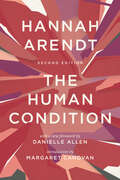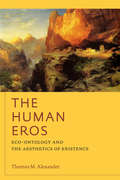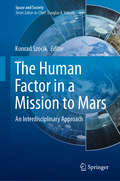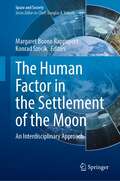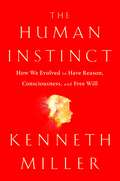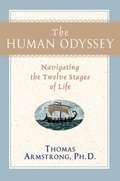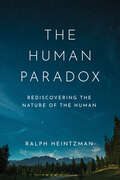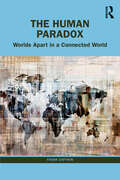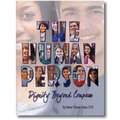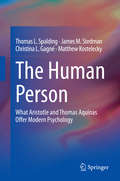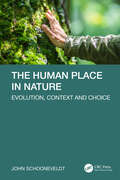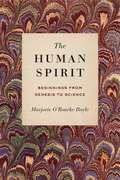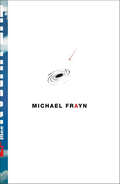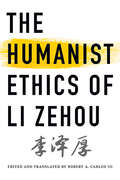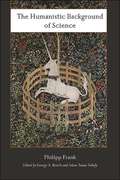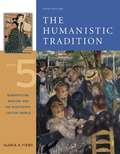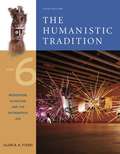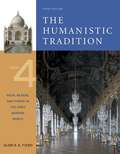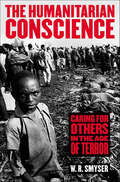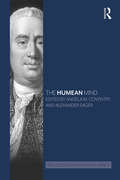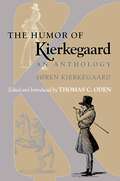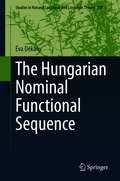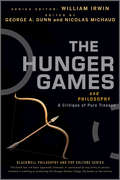- Table View
- List View
The Human Condition: Second Edition
by Hannah ArendtThe renowned political thinker and author of The Origins of Totalitarianism examines the troubling consequences of humanity’s increasing power.A work of striking originality, The Human Condition is in many respects more relevant today than when it first appeared in 1958. In her study of the state of modern humanity, Hannah Arendt considers humankind in terms of its ever-expanding capabilities. Her analysis reveals a troubling paradox: that as human powers increase through technological and humanistic inquiry, we are less equipped to control the consequences of our actions. This new edition contains Margaret Canovan’s 1998 introduction and a new foreword by Danielle Allen. A classic in political and social theory, The Human Condition offers a penetrating analysis of a conundrum that has only become more acute in the 21st century.
The Human Eros: Eco-ontology and the Aesthetics of Existence (American Philosophy)
by Thomas M. AlexanderThe Human Eros explores themes in classical American philosophy, primarily the thought of John Dewey, but also that of Ralph Waldo Emerson, George Santayana, and Native American traditions. Alexander’s primary claim is that human beings have an inherent need to experience meaning and value, a “Human Eros.” Our various cultures are symbolic environments or “spiritual ecologies” within which the Human Eros seeks to thrive. This is how we inhabit the earth. Encircling and sustaining our cultural existence is nature, yet Western philosophy has not provided adequate conceptual models for thinking ecologically. Alexander introduces the idea of “eco-ontology” to explore ways in which this might be done, beginning with the primacy of Nature over Being but also including the recognition of possibility and potentiality as inherent aspects of existence. He argues for the centrality of Dewey’s thought to an effective ecological philosophy. Both “pragmatism” and “naturalism,” he shows, need to be contextualized within an emergentist, relational, nonreductive view of nature and an aesthetic, imaginative, nonreductive view of intelligence.
The Human Factor in a Mission to Mars: An Interdisciplinary Approach (Space and Society)
by Konrad SzocikA manned mission to Mars is faced with challenges and topics that may not be obvious but of great importance and challenging for such a mission. This is the first book that collects contributions from scholars in various fields, from astronomy and medicine, to theology and philosophy, addressing such topics. The discussion goes beyond medical and technological challenges of such a deep-space mission. The focus is on human nature, human emotions and biases in such a new environment.The primary audience for this book are all researchers interested in the human factor in a space mission including philosophers, social scientists, astronomers, and others. This volume will also be of high interest for a much wider audience like the non-academic world, or for students.
The Human Factor in the Settlement of the Moon: An Interdisciplinary Approach (Space and Society)
by Konrad Szocik Margaret Boone RappaportApproaching the settlement of our Moon from a practical perspective, this book is well suited for space program planners. It addresses a variety of human factor topics involved in colonizing Earth's Moon, including: history, philosophy, science, engineering, agriculture, medicine, politics & policy, sociology, and anthropology. Each chapter identifies the complex, interdisciplinary issues of the human factor that arise in the early phases of settlement on the Moon. Besides practical issues, there is some emphasis placed on preserving, protecting, and experiencing the lunar environment across a broad range of occupations, from scientists to soldiers and engineers to construction workers. The book identifies utilitarian and visionary factors that shape human lives on the Moon. It offers recommendations for program planners in the government and commercial sectors and serves as a helpful resource for academic researchers. Together, the coauthors ask and attempt to answer: “How will lunar society be different?”
The Human Instinct: How We Evolved to Have Reason, Consciousness, and Free Will
by Kenneth R. MillerA radical, optimistic exploration of how humans evolved to develop reason, consciousness, and free will.Lately, the most passionate advocates of the theory of evolution seem to present it as bad news. Scientists such as Richard Dawkins, Lawrence Krauss, and Sam Harris tell us that our most intimate actions, thoughts, and values are mere byproducts of thousands of generations of mindless adaptation. We are just one species among multitudes, and therefore no more significant than any other living creature. Now comes Brown University biologist Kenneth R. Miller to make the case that this view betrays a gross misunderstanding of evolution. Natural selection surely explains how our bodies and brains were shaped, but Miller argues that it’s not a social or cultural theory of everything. In The Human Instinct, he rejects the idea that our biological heritage means that human thought, action, and imagination are pre-determined, describing instead the trajectory that ultimately gave us reason, consciousness and free will. A proper understanding of evolution, he says, reveals humankind in its glorious uniqueness—one foot planted firmly among all of the creatures we’ve evolved alongside, and the other in the special place of self-awareness and understanding that we alone occupy in the universe. Equal parts natural science and philosophy, The Human Instinct is a moving and powerful celebration of what it means to be human.
The Human Odyssey: Navigating the Twelve Stages of Life
by Thomas ArmstrongTravel through the first stirrings of life in the womb to the anticipation of death and even beyond. In a unique synthesis, Thomas Armstrong draws on a wide range of sources from various disciplines and cultures to fashion a compelling narrative. The core of this enlightening guide consists of 12 chapters, each describing a different period of life, with its own unique changes, struggles, and growth. A final chapter poses the possibility that the voyage may even continue after physical death.
The Human Paradox: Rediscovering the Nature of the Human
by Ralph HeintzmanWhat is a human being? What does it mean to be human? How can you lead your life in ways that best fulfil your own nature? In The Human Paradox, Ralph Heintzman explores these vital questions and offers an exciting new vision of the nature of the human. The Human Paradox aims to counter or correct several contemporary assumptions about the nature of the human, especially the tendency of Western culture, since the seventeenth century, to identify the human with rationality and the rational mind. Using the lens of the virtues, The Human Paradox shows how rediscovering the nature of the human can help not just to understand one’s own paradoxical nature but to act in ways that are more consistent with its full reality. Offering accessible insight from both traditional and contemporary thought, The Human Paradox shows how a fuller, richer vision of the human can help address urgent contemporary problems, including the challenges of cultural and religious diversity, human migration and human rights, the role of the market, artificial intelligence, the future of democracy, and global climate change. This fresh perspective on the Western past will guide readers into what it means to be human and open new possibilities for the future.
The Human Paradox: Worlds Apart in a Connected World
by Frank GaffikinIn The Human Paradox: Worlds Apart in a Connected World, author Frank Gaffikin probes widely and meticulously into our past and present to analyse the connections between the many acute polarisations that mark contemporary times. Addressing profound issues related to Trumpism, Brexit, the outbreak of Covid-19 and ensuing pandemic, and environmental change, the book argues that beneath all the present social tumult lies a fundamental dilemma for human stability and progress, namely how we can be estranged from what we refer to as humanity. The book begins with an appraisal of populism and authoritarian nationalism, and later explores whether, in our human development, we are bound for enhancement or extinction. Interrogating these big ideas further, the book identifies three central challenges that confront us as a society: living on the planet, living with the planet, and living with one another on the planet. These challenges prompt a re-think of what it is to be human and social, and hinging on these key themes, the book thus concludes with consideration of a radical agenda for future social improvement. Rather than peering through the conventional lenses offered by separate disciplines, this book argues for interdisciplinary appreciation and recognition, especially so if we are to address the dilemma at the center of its concern. The Human Paradox will appeal to readers interested in the major conflicts of our times, as well as students of subjects including sociology, politics, history, and economics.
The Human Person: Dignity Beyond Compare (Third Edition)
by Terese AuerToday more than ever, there is a need for the truth to be known, especially the truth about the dignity of the human person. <P> We need the light of that truth to shine into the murky waters of moral confusion. Harsh and noisy voices in our society cry out proclaiming a woman's "so-called right" to destroy the life within her womb. <P><P>They demand scientific experimentation that threatens human dignity. They demean human sexuality and marriage. They threaten the weakest and most vulnerable members of our human family. <P>In these all-important battles of our day, victory will not go to the loudest; victory will always be on the side of Truth. (From the Prologue)
The Human Person: What Aristotle and Thomas Aquinas Offer Modern Psychology
by Thomas L. Spalding James M. Stedman Christina L. Gagné Matthew KosteleckyThis book introduces the Aristotelian-Thomistic view of the human person to a contemporary audience, and reviews the ways in which this view could provide a philosophically sound foundation for modern psychology. The book presents the current state of psychology and offers critiques of the current philosophical foundations. In its presentation of the fundamental metaphysical commitments of the Aristotelian-Thomistic view, it places the human being within the broader understanding of the world. Chapters discuss the Aristotelian-Thomistic view of human and non-human cognition as well as the relationship between cognition and emotion. In addition, the book discusses the Aristotelian-Thomistic conception of human growth and development, including how the virtue theory relates to current psychological approaches to normal human development, the development of character problems that lead to psychopathology, current conceptions of positive psychology, and the place of the individual in the social world. The book ends with a summary of how Aristotelian-Thomistic theory relates to science in general and psychology in particular. The Human Person will be of interest to psychologists and cognitive scientists working within a number of subfields, including developmental psychology, social psychology, cognitive psychology, and clinical psychology, and to philosophers working on the philosophy of psychology, philosophy of mind, and the interaction between historical philosophy and contemporary science, as well as linguists and computer scientists interested in psychology of language and artificial intelligence.
The Human Place in Nature: Evolution, Context and Choice
by John SchooneveldtThis book explores a new approach to understanding the evolution of mind and consciousness by examining the perceptual abilities of animals and the way they experience their world. It offers a science-based bottom-up approach to our own conscious worldview by seeing it through the eyes of others. Emphasis is on the role of context in evolution and the way animals internalize and engage with the contextual properties of their world that are meaningful for them. The core argument is that a context, which is subjective and comprised of the perceptual capacities, offers new insights into the evolution of mind. Rather than seeing biological evolution in terms of the emergence of mindless forms and cultural evolution as the emergence of disembodied minds, the book seeks to integrate these two perspectives through the rigorous mapping of contexts.Key Features Reveals an understanding of animal minds Formulates a hypothesis for the evolution of consciousness Includes a discussion of the origin of technological innovation Provides a rationale for the ecology of mind Proposes a theory of the evolution of language Outlines the science of experience and how it influences choice Explains the role of context and choice with respect especially to human ecology
The Human Spirit: Beginnings from Genesis to Science
by Marjorie O’Rourke BoyleIn this volume, Marjorie O’Rourke Boyle probes significant concepts of the human spirit in Western religious culture across more than two millennia, from the book of Genesis to early modern science. The Human Spirit treats significant interpretations of human nature as religious in political, philosophical, and physical aspects by tracing its historical subject through the Priestly tradition of the Hebrew Bible and the writings of the apostle Paul among the Corinthians, the innovative theologians Augustine and Aquinas, the reformatory theologian Calvin, and the natural philosopher and physician William Harvey. Boyle analyzes the particular experiences and notions of these influential authors while she contextualizes them in community. She shows how they shared a conviction, although distinctly understood, of the human spirit as endowed by or designed by a divine source of everything animate.An original and erudite work that utilizes a rich and varied array of primary source material, this volume will be of interest to intellectual and cultural historians of religion, philosophy, literature, and medicine.
The Human Spirit: Beginnings from Genesis to Science
by Marjorie O’Rourke BoyleIn this volume, Marjorie O’Rourke Boyle probes significant concepts of the human spirit in Western religious culture across more than two millennia, from the book of Genesis to early modern science. The Human Spirit treats significant interpretations of human nature as religious in political, philosophical, and physical aspects by tracing its historical subject through the Priestly tradition of the Hebrew Bible and the writings of the apostle Paul among the Corinthians, the innovative theologians Augustine and Aquinas, the reformatory theologian Calvin, and the natural philosopher and physician William Harvey. Boyle analyzes the particular experiences and notions of these influential authors while she contextualizes them in community. She shows how they shared a conviction, although distinctly understood, of the human spirit as endowed by or designed by a divine source of everything animate.An original and erudite work that utilizes a rich and varied array of primary source material, this volume will be of interest to intellectual and cultural historians of religion, philosophy, literature, and medicine.
The Human Touch: Our Part in the Creation of a Universe
by Michael FraynWhat do we really know? What are we in relation to the world around us? Here, the acclaimed playwright and novelist takes on the great questions of his career—and of our livesHumankind, scientists agree, is an insignificant speck in the impersonal vastness of the universe. But what would that universe be like if we were not here to say something about it? Would there be numbers if there were no one to count them? Would the universe even be vast, without the fact of our smallness to give it scale? With wit, charm, and brilliance, this epic work of philosophy sets out to make sense of our place in the scheme of things. Our contact with the world around us, Michael Frayn shows, is always fleeting and indeterminate, yet we have nevertheless had to fashion a comprehensible universe in which action is possible. But how do we distinguish our subjective experience from what is objectively true and knowable? Surveying the spectrum of philosophical concerns from the existence of space and time to relativity and language, Frayn attempts to resolve what he calls "the oldest mystery": the world is what we make of it. In which case, though, what are we?All of Frayn's novels and plays have grappled with these essential questions; in this book he confronts them head-on.
The Humanist Ethics of Li Zehou (SUNY series, Translating China)
by Zehou LiLi Zehou's thought has achieved wide popularity and influence among both academic readers and the broader Chinese-reading public. His culminating views on ethics are collected here in a series of essays that highlight the importance of Confucian philosophy today. Li's groundbreaking ethics presents a powerful contemporary theory—one that inventively reconciles longstanding oppositions between relativism and absolutism, emotions and rationalism, and relationality and individuality. Seeing ethical values and principles as embedded in human psychology, society, and history, Li affirms their relativity; he also affirms the objective rightness and wrongness of beliefs, norms, and acts through their contribution to human progress and flourishing. Li thereby endorses modern Enlightenment liberal values, including individualism, rights, and freedoms, but from an original philosophical foundation. By drawing on classical Confucianism to prioritize the situated, relational, emotional constitution of human life, this concrete brand of humanism offers unique modern conceptions of the nature of reason, the source of morality, selfhood, virtue, and much more.
The Humanistic Background of Science (SUNY series in American Philosophy and Cultural Thought)
by Philipp FrankPhilipp Frank (1884–1966) was an influential philosopher of science, public intellectual, and Harvard educator whose last book, The Humanistic Background of Science, is finally available. Never published in his lifetime, this original manuscript has been edited and introduced to highlight Frank's remarkable but little-known insights about the nature of modern science—insights that rival those of Karl Popper and Frank's colleagues Thomas Kuhn and James Bryant Conant. As a leading exponent of logical empiricism and a member of the famous Vienna Circle, Frank intended his book to provide an accessible, engaging introduction to the philosophy of science and its cultural significance. The book is steadfastly true to science; to aspirations of peace, unity, and human flourishing after World War II; and to the pragmatic philosophies of Charles S. Peirce, William James, and John Dewey that Frank embraced in his new American home. Amidst the many recent surveys and retrospective analyses of midcentury philosophy of science, The Humanistic Background of Science offers an original, first-hand view of Frank's post-European life and of intellectual dramas then unfolding in Chicago, New York City, and Boston.
The Humanistic Tradition Book 5: Romanticism, Realism, and the Nineteenth-Century World
by Gloria K. FieroThe Humanistic Tradition explores the political, economic, and social contexts of human culture, providing a global and multicultural perspective which helps students better understand the relationship between the West and other world cultures.
The Humanistic Tradition Book 6 Modernism, Globalism, and the Information Age, 5th Edition
by Gloria K. FieroThe Humanistic Tradition features a flexible, topical approach that helps students understand humankind's creative legacy as a continuum rather than as a series of isolated events.
The Humanistic Tradition, Book 4: Faith, Reason, and Power in the Early Modern World (Fifth Edition)
by Gloria K. FieroThis book focuses on the creative legacy referred to collectively as the humanities: literature, philosophy, history (in its literary dimension), architecture, the visual arts (including photography and film), music, and dance.
The Humanitarian Conscience: Caring for Others in the Age of Terror
by W. R. SmyserHumanitarian action, long dismissed as a realm apart from major foreign policy concerns, has become an omnipresent element in international affairs. It now shapes the world in which we live and it will have increasingly imporant impact on the way decisions are made in international crises. W.R. Smyser looks at the history of humanitarian activity and it's growth since the horrors of WWII were made public, tracing its early stages connected to the creation of the Universal Declaration of Human Rights to the present day when human rights groups, such as Human Rights Watch, are as influential as modern nation states in influencing the course of internation events. This is a monumental portrait of the way in which individuals who are not officially part of any government work to alleviate human suffering and physical destruction around the world.
The Humanities "crisis" And The Future Of Literary Studies
by Paul JayDemonstrating that the supposed drawbacks of the humanities are in fact their source of practical value, Jay explores current debates about the role of the humanities in higher education, puts them in historical context, and offers humanists and their supporters concrete ways to explain the practical value of a contemporary humanities education.
The Humean Mind (Routledge Philosophical Minds)
by Angela M. Coventry Alexander SagerDavid Hume (1711–1776) is widely acknowledged as one of the most important philosophers in the English language, with his work continuing to exert major influence on philosophy today. His empiricism, naturalism, and psychology of the mind and the passions shape many positions and approaches in the sciences and social sciences. The Humean Mind seeks to provide a comprehensive survey of his work, not only placing it in its historical context but also exploring its contemporary significance. Comprising 38 chapters by a team of international contributors the Handbook is divided into four sections: · Intellectual context · Hume’s thought · Hume’s reception · Hume’s legacy This handbook includes coverage of all major aspects of Hume’s thought with essays spanning the full scope of Hume’s philosophy. Topics explored include Hume’s reception in the eighteenth and nineteenth centuries; Hume’s legacy in the twentieth and twenty-first centuries; Hume’s history, including an essay on Hume as historian, as well as essays on the relevance of history to Hume’s philosophy and his politics, and an updated treatment of Hume’s Legal Philosophy. Also included are essays on race, gender, and animal ethics. Essential reading for students and researchers in philosophy, Hume’s work is central to epistemology, metaphysics, philosophy of mind, philosophy of science, ethics, legal philosophy and philosophy of religion.
The Humor of Kierkegaard: An Anthology
by Søren KierkegaardWho might reasonably be nominated as the funniest philosopher of all time? With this anthology, Thomas Oden provisionally declares Søren Aabye Kierkegaard (1813-1855)--despite his enduring stereotype as the melancholy, despairing Dane--as, among philosophers, the most amusing. Kierkegaard not only explored comic perception to its depths but also practiced the art of comedy as astutely as any writer of his time. This collection shows how his theory of comedy is integrated into his practice of comic perception, and how both are integral to his entire authorship. Kierkegaard's humor ranges from the droll to the rollicking; from farce to intricate, subtle analysis; from nimble stories to amusing aphorisms. In these pages you are invited to meet the wife of an author who burned her husband's manuscript and a businessman who, even with an abundance of calling cards, forgot his own name. You will hear of an interminable vacillator whom archeologists found still pacing thousands of years later, trying to come to a decision. Then there is the emperor who became a barkeeper in order to stay in the know. The Humor of Kierkegaard is for anyone ready to be amused by human follies. Those new to Kierkegaard will discover a dazzling mind worth meeting. Those already familiar with his theory of comedy will be delighted to see it concisely set forth and exemplified. Others may have read Kierkegaard intensively without having ever really noticed his comic side. Here they will find what they have been missing.
The Hungarian Nominal Functional Sequence (Studies in Natural Language and Linguistic Theory #100)
by Éva DékányThe Hungarian Nominal Functional Sequence combines the methods of syntactic cartography with evidence from compositional semantics in a comprehensive exploration of the structure of Noun Phrases. Proceeding from the lexical core to the top of DP, it uses Hungarian as a window on the underlying universal functional hierarchy of Noun Phrases, but it also regularly complements and supports the analysis with cross-linguistic evidence. The book works out a minimal map of the extended NP in the sense that the proposed hierarchy only has projections which host overt material and it does not draw on semantically empty word order projections. Topics which receive special attention include the syntax of classifiers, demonstratives, proper names, possessive NPs and plural pronouns.
The Hunger Games and Philosophy
by George A. Dunn Nicolas MichaudA philosophical exploration of Suzanne Collins's New York Times bestselling series, just in time for the release of The Hunger Games movie Katniss Everdeen is "the girl who was on fire," but she is also the girl who made us think, dream, question authority, and rebel. The post-apocalyptic world of Panem's twelve districts is a divided society on the brink of war and struggling to survive, while the Capitol lives in the lap of luxury and pure contentment. At every turn in the Hunger Games trilogy, Katniss, Peeta, Gale, and their many allies wrestle with harrowing choices and ethical dilemmas that push them to the brink. Is it okay for Katniss to break the law to ensure her family's survival? Do ordinary moral rules apply in the Arena? Can the world of The Hunger Games shine a light into the dark corners of our world? Why do we often enjoy watching others suffer? How can we distinguish between what's Real and Not Real? This book draws on some of history's most engaging philosophical thinkers to take you deeper into the story and its themes, such as sacrifice, altruism, moral choice, and gender. Gives you new insights into the Hunger Games series and its key characters, plot lines, and ideas Examines important themes such as the state of nature, war, celebrity, authenticity, and social class Applies the perspective of some of world's greatest minds, such as Charles Darwin, Thomas Hobbes, Friedrich Nietzsche, Plato, and Immanuel Kant to the Hunger Games trilogy Covers all three books in the Hunger Games trilogy An essential companion for Hunger Games fans, this book will take you deeper into the dystopic world of Panem and into the minds and motivations of those who occupy it.
